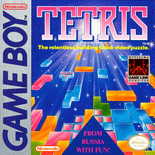
































Tetris

Tetris is a Soviet tile-matching puzzle video game originally designed and programmed by Alexey Pajitnov. It was released on June 6, 1984, while he was working for the Dorodnicyn Computing Centre of the Academy of Science of the USSR in Moscow. He derived its name from the Greek numerical prefix tetra- (all of the game's pieces contain four segments) and tennis, Pajitnov's favorite sport.
It is also the first entertainment software to be exported from the USSR to the US and published by Spectrum HoloByte for Commodore 64 and IBM PC. The Tetris game is a popular use of tetrominoes, the four-element special case of polyominoes. Polyominoes have been used in popular puzzles since at least 1907, and the name was given by the mathematician Solomon W. Golomb in 1953. However, even the enumeration of pentominoes is dated to antiquity.
The game (or one of its many variants) is available for nearly every video game console and computer operating system, as well as on devices such as graphing calculators, mobile phones, portable media players, PDAs, Network music players and even as an Easter egg on non-media products like oscilloscopes. It has even inspired Tetris serving dishes and been played on the sides of various buildings.
While versions of Tetris were sold for a range of 1980s home computer platforms as well as the arcades, it was the hugely successful handheld version for the Game Boy launched in 1989 that established the game as one of the most popular ever. Electronic Gaming Monthly's 100th issue had Tetris in first place as 'Greatest Game of All Time'. In 2007, Tetris came in second place in IGN's '100 Greatest Video Games of All Time'. In January 2010, it was announced that Tetris had sold more than 170 million copies, approximately 70 million physical copies and over 100 million copies for cell phones, making it the highest paid-downloaded game of all time.
Tetriminos are game pieces shaped like tetrominoes, geometric shapes composed of four square blocks each. A random sequence of Tetriminos fall down the playing field (a rectangular vertical shaft, called the 'well' or 'matrix'). The objective of the game is to manipulate these Tetriminos, by moving each one sideways and rotating it by 90 degree units, with the aim of creating a horizontal line of ten blocks without gaps. When such a line is created, it disappears, and any block above the deleted line will fall. When a certain number of lines are cleared, the game enters a new level. As the game progresses, each level causes the Tetriminos to fall faster, and the game ends when the stack of Tetriminos reaches the top of the playing field and no new Tetriminos are able to enter. Some games also end after a finite number of levels or lines.
All of the Tetriminos are capable of single and double clears. I, J, and L are able to clear triples. Only the I Tetrimino has the capacity to clear four lines simultaneously, and this is referred to as a 'tetris'. (This may vary depending on the rotation and compensation rules of each specific Tetris implementation. For instance, in the Super Rotation System used in most recent implementations, certain situations allow T, S, and Z to 'snap' into tight spots and clear triples.)
How to play:
Click on the joystick icon in the Tetris online emulator to see how to control the Tetris game









































Comments